#pierre de coubertin
Photo
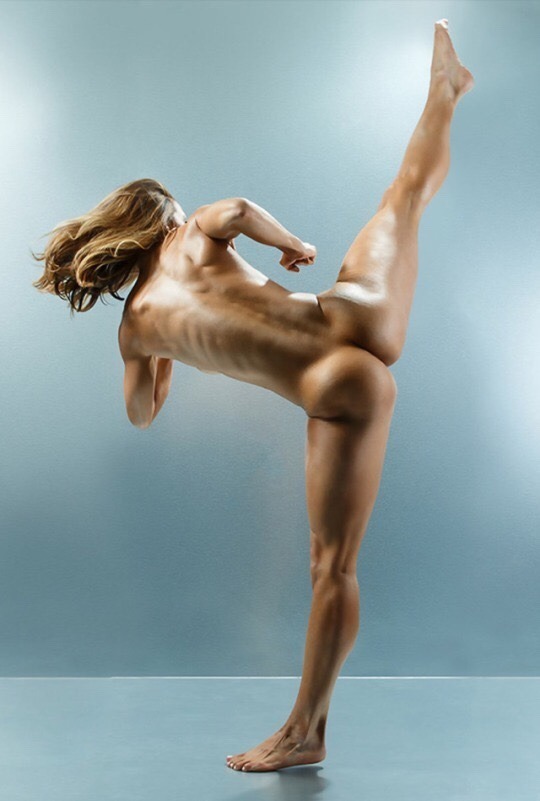
Citius, Altius, Fortius.
- Pierre de Coubertin
Faster, Higher, Stronger.
#latin#quote#femme#beauty#physical#the body#sports#olympian#coubertin#pierre de coubertin#french#olympian ideal#classical
111 notes
·
View notes
Text
youtube
L'esprit Coubertin réalisé par Jérémy Sein, coécrit avec Mathias Gavarry et Fanny Burdino, avec Benjamin Voisin, Emmanuelle Bercot, Rivaldo Pawawi, Augustin Shackelpopoulos, Sacha Béhar 😍
youtube
Un amour impossible (Christine Angot) | Fiche de Lecture avec Augustin Shackelpopoulos et Sacha Béhar (2016)
#cinéma#rire#jérémy sein#mathias gavarry#fanny burdino#benjamin voisin#emmanuelle bercot#rivaldo pawawi#Augustin Shackelpopoulos#Sacha Béhar#pierre de coubertin#jeux olympiques
1 note
·
View note
Text
Calacus Monthly Hit & Miss – World Athletics and Sebastian Coe
Every month we look at the best and worst communicators in the sports world from the last few weeks.
WORLD ATHLETICS & SEBASTIAN COE
The Olympic Games is considered to be the pinnacle of sporting achievement for most sports.
The opportunity, every four years, to represent your country and compete against the world’s best underlines the importance of Pierre de Coubertin’s vision for the modern Games.
De Coubertin was committed to Olympic athletes being amateurs, with professionalism considered a risk to sport’s integrity.
There have been reports that athletics and cycling events provided cash prizes as far back as 1900, with Britain’s Edgar Bredin receiving 250 francs for his victory in the 100m.
Conversely, in 1912, Jim Thorpe was stripped of his track and field medals for taking money for expenses when playing baseball.
It would be a further 60 years before the strict rules on amateurism were relaxed, due in no small part to athletes in the Communist Eastern bloc bypassing the rules through their state-controlled ‘employment’ while training for sport full-time.
By the 1992 Olympic Games in Barcelona, when Team USA fielded NBA all stars that swept to gold in the basketball, any hint at amateurism was over.
Athletes could secure lucrative sponsorships and endorsement deals, with national governing bodies providing financial assistance where they could, with 60% of National Olympic Committees giving bonuses to their athletes too.
But unlike other sporting competitions, the Olympic Games remained free of prize money until World Athletics made their surprise announcement in early April.
Starting at the Paris 2024 Olympic Games this summer, gold medallists in 48 athletic events will walk away with US$50,000 in prize money, with the rewards being extended to podium medallists from Los Angeles 2028 onwards.
World Athletics President Sebastian Coe said: “The introduction of prize money for Olympic gold medallists is a pivotal moment for World Athletics and the sport of athletics as a whole, underscoring our commitment to empowering the athletes and recognising the critical role they play in the success of any Olympic Games.
“This is the continuation of a journey we started back in 2015, which sees all the money World Athletics receives from the International Olympic Committee for the Olympic Games go directly back into our sport.
“We started with the Olympic dividend payments to our Member Federations, which saw us distribute an extra US$5m a year on top of existing grants aimed at athletics growth projects, and we are now in a position to also fund gold medal performances for athletes in Paris, with a commitment to reward all three medallists at the LA28 Olympic Games.
“While it is impossible to put a marketable value on winning an Olympic medal, or on the commitment and focus it takes to even represent your country at an Olympic Games, I think it is important we start somewhere and make sure some of the revenues generated by our athletes at the Olympic Games are directly returned to those who make the Games the global spectacle that it is.”
Sport is nothing without its athletes, so rewarding them financially, when some are not attracting huge sponsorships and endorsement deals, could be seen as a positive step.
But when making such a momentous announcement in the history of the Olympic Games, World Athletics made a basic error which they could and should have avoided: they had not discussed or even informed the International Olympic Committee (IOC) or other stakeholders ahead of making their statement.
“The one thing the International Olympic Committee has consistently recognised – and they’re right to – is the primacy of international federations to fashion their own futures,” explained Coe.
“I don’t believe this is remotely at variance with the concept that the International Olympic Committee often talks about, which is recognising the efforts that our competitors make.
“I am hoping the IOC would share in this principle, given their avowed commitment to make sure that revenues raised through the Olympic Movement find their way back onto the front line. I think they make the point that 80 or 90 per cent of that goes back.”
The IOC made a statement of its own, explaining how it spends the $7.6bn it made between 2017 and 2021 in revenues from the Olympic Games.
It has also provided training grants of up to $1500 through an IOC division called Solidarity, awarding over 1800 grants worldwide on an original budget of $32 million ahead of the Tokyo Games.
It said: “The IOC redistributes 90% of all its income, in particular to the National Olympic Committees and International Federations. This means that, every day, the equivalent of $4.2m goes to help athletes and sports organisations at all levels around the world. It is up to each IF and NOC to determine how to best serve their athletes and the global development of their sport.”
That is where some of the problems lie – track and field is one of the highlights of the Olympic Games, but if other sports cannot afford to match the prize money, it could create conflict between the haves and the have nots.
The Association of Summer Olympic International Federations (ASOIF) voiced their concern about the process as well as the context of the announcement.
The stated: “ASOIF was neither informed nor consulted in advance of the announcement, which was made one day after the ASOIF General Assembly and during SportAccord. As a matter of principle, ASOIF respects and defends the autonomy of each and every member federation. However, when a decision of one IF has a direct impact on the collective interests of the Summer Olympic IFs, it is important and fair to discuss the matter at stake with the other federations in advance. This is precisely why ASOIF was created more than 40 years ago, with the mission to unite, promote and support its members, while advocating for their common interests and goals.
“ASOIF has historically taken a close interest in the general issue of athlete compensation, particularly within the context of Olympic Agenda 2020 and vis a vis the professional leagues since 2014.
“During the last days, ASOIF’s membership has expressed several concerns about World Athletics’ announcement. First, for many, this move undermines the values of Olympism and the uniqueness of the Games. One cannot and should not put a price on an Olympic gold medal and, in many cases, Olympic medallists indirectly benefit from commercial endorsements. This disregards the less privileged athletes lower down the final standings.
“Second, not all sports could or should replicate this move, even if they wanted to. Paying prize money in a multi-sport environment goes against the principle of solidarity, reinforces a different set of values across the sports and opens up many questions.
“If the Olympic Games are considered as the pinnacle of each sport, then the prize money should be comparable to, and commensurate with, the prizes given in the respective top competitions of each sport. This is technically and financially unfeasible.
“Furthermore, the International Olympic Committee (IOC) is the owner and primary rights holder of the Olympic Games. IFs establish and enforce the competition rules at the Games.
“ASOIF fully agrees that athletes are at the centre of the Olympic Movement, and play a critical role in the success of any Olympic Games. However, it appears that World Athletics’ latest initiative opens rather than solves a number of complex issues.
“ASOIF will raise these concerns with World Athletics and will continue to promote dialogue amongst its members and the IOC. Unity and solidarity among ASOIF’s membership will remain crucial to ensure a healthy future of sports governance and the Olympic Movement at large.”
That was a fairly damning response to the news.
The Association of National Olympic Committees of Africa (ANOCA) released a statement following consultation with athlete representatives.
“Some athlete representatives expressed concerns about the fairness of the proposal, which would result in only gold medallists from one sport being rewarded for their achievements. Concerns were also raised on the issue of clean sport, as by increasing the incentive to win even more, athletes may be at risk of betting, manipulation or pressure to turn to doping," the organisation said.
"Athletes' representatives welcomed the idea of rewarding athletes for their efforts and achievements as elite athletes, but this should not be at the expense of the solidarity model that supports and develops athletes at all levels of sport."
Coe was Chair of the British Olympic Association until 2016, but its current chief executive, Andy Anson, criticised the announcement.
"What wasn't great about the announcement last week is when one sport goes off and does something on their own, doesn't include the sports, doesn't include the IOC, doesn't include the National Olympic Committees," Anson told Sky News.
"They create a problem because now other sports are clearly going to get some scrutiny or even pressure from athletes saying, 'Well what about us? How can this sport do it and not others?'.
"I don't think it's particularly appropriate or helpful for one sport just to announce that. We've got to look at it holistically and make sure that we don't create a two tier system.”
Head of World Rowing, Jean-Christophe Rolland, was concerned about the lack of consultation before World Athletics made their announcement and commented: “I fully respect the WA decision as long it concerns athletes from their sport but at the Olympic Games it is not about your sport but all sports.
"I would appreciate if we had the discussion between us. This decision impacts not only athletes. It has other implications."
There were some supporters when the news broke, though.
Team GB’s most decorated Olympic swimmer. Duncan Scott, is all in favour of payments for Olympic medals.
He said: “I definitely think it would be welcomed within swimming. It's taxing so much on the body in terms of 20-plus hours a week in the pool and so many gym sessions. It can be really tough being a swimmer in GB but Aquatics GB seem like they're wanting to move it in a positive direction."
Coe is a seasoned politician, having become a Lord after a spell as a Member of Parliament in Britain and helping London win the 2012 Olympic Games before his positions in sports administration.
Putting the athletes at the heart of his strategy appears admirable, and he explained that not all elite athletes are thriving, with their finances often “precarious.”
To make such an aggressive move, without collaborating with the IOC and other stakeholders, might appear naïve and foolhardy but equally could be a shot across the bows amid speculation that he wants to become the next IOC President.
Rather than adhering to the status quo, Coe has proved himself to be an alternative, positioning himself firmly against Russian athletes competing at the Olympic Games as neutrals.
And the prize money issue comes ahead of the Friendship Games, to be held in Russia in September, offering $100m in total prize money and run by Umar Kremlev, head of the International Boxing Association which has been excluded from running Olympic boxing due to governance issues.
The first Friendship Games is expected to attract up to 6,000 athletes from more than 70 nations amid the backdrop of its invasion of Ukraine and punishments for state-sponsored doping.
When launched, the IOC issued a powerful communique which it accused of being a “cynical attempt by the Russian Federation to politicize sport,” noting a “disrespect for the athletes and the integrity of sports competitions.
“The commission even sees the risk of athletes being forced by their governments into participating in such a fully politicized sports event, thereby being exploited as part of a political propaganda campaign.”
With such significant prize money available, despite a lack of sports governance recognition, the Friendship Games represent a real threat to the IOC.
Could the World Athletics announcement be the start of more serious discussions to award all Olympic victors a cash prize, even if it costs up to $100m each Games? And would that see off the threat the Friendship Games poses?
Or should competing for glory be reward enough when the value of winning Olympic gold is so immeasurable?
Coe thinks not and said: “This fits very much with a contemporary template that we should do everything we can to recognise the performance and primacy of athletes.
“As a president who was a double Olympic champion, the largest part of my life has been involved with the Olympic movement. The world has changed. I don’t believe this is at variance with any deeply held philosophical commitment to the Olympic movement which, as a sport, we clearly have.
“It is important we start somewhere and make sure some of the revenues generated by our athletes … are directly returned to those who make the Games the global spectacle that it is. And as we grow as a sport I want to increase that pot.
“I have to accept the world has changed. If you had asked me that question 30 or 40 years ago,” whether paying athletes for winning was in line with what Scott called the Olympic ‘ethos, I might have given you a different answer.”
The key learning here is to ensure collaboration and discussion with stakeholders to gain support and understanding.
By blindsiding the IOC, ASOIF and other governing bodies, World Athletics very much set its stall out as a renegade, making a rogue decision regardless of the wider consequences for other sports federations and their athletes.
Coupled with the Friendship Games, the developments threaten the IOC’s authority just ahead of Paris 2024, which will no doubt serve as a reminder of the excellence and inspiration the Olympic Games continue to provide.
#ASOIF#World Athletics Championships#IAAF#Seb Coe#Sebastian Coe#ANOCA#IOC#International Olympic Committee#Thomas Bach#Friendship Games#World Rowing#Pierre de Coubertin#BOA#British Olympic Association#London 2012
0 notes
Text
Font-Romeu : Un nouvel internat avec des lits surdimensionnés pour les athlètes
Conçu pour améliorer les conditions de vie et d’étude des 177 internes de la cité scolaire, l’internat a également été pensé pour accueillir les sportifs de haut niveau évoluant au sein du Centre national d’Entrainement en Altitude (CNEA), en s’adaptant à leurs spécificités : mobiliers adaptés aux grandes tailles (lits surdimensionnés), local de stockage pour l’équipement des athlètes,…

View On WordPress
#athlètes#Carole Delg#Centre national d’Entrainement en Altitude#CNEA#Font-Romeu#Hermeline Malherbe#internat#internes#Pierre de Coubertin
0 notes
Text
an hour into watching the atlanta 96 olympic opening ceremony and i can only conclude i've never seen it or heard it talked about before is because it goes too hard
#ok the pierre de coubertin segment they're on now is a snoozer but the cheerleaders spelling out how y'all doing earlier!!! hello!!!#georgia on my mind!#summertime!!!#parlez-vous olympics
0 notes
Text
Winning Strategies For Games Of Chance
Winning strategies for games of chance #Poohsticks
In an Olympic year it might be churlish to gainsay the founder of the modern games, Baron Pierre de Coubertin, whose mantra was that “the most important thing in the Olympic Games is not winning but taking part; the essential thing in life is not conquering but fighting well”. That is all very well, but for some psychologists and game theorists rock, paper, scissors (RPS) offered the opportunity…

View On WordPress
#AA Milne#Baron Pierre de Coubertin#Dr Rhys Morgan#Neil Farber#Physics and Society#Poohsticks#Posingford Bridge#Psychology Today#Rock paper scissors#VisitEngland
0 notes
Text
Step into sporting history with a stay at the home of the founder of the modern Olympics, now on Airbnb
With almost a year until Paris 2024, the childhood home of Baron Pierre de Coubertin has been transformed to take guests on a journey through time. For one night only guests will get the opportunity to immerse themselves in Olympic history in Château de Mirville, an iconic stop on the Olympic torch relay in 2024.
Built in the 16th century, Château de Mirville is where the young Coubertin…

View On WordPress
0 notes
Text
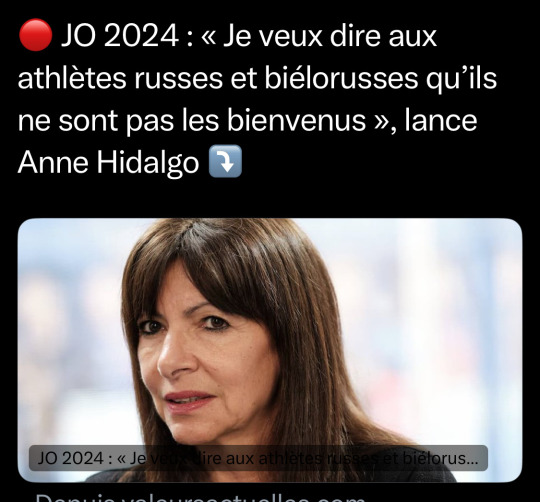
Annie Dingo, la dinde ibérique illettrée "veut dire" que les J.O. c’est comme ça ! Pierre de quoi ? Coubertin ? Pfff elle n’a pas de temps à perdre avec des gens de droâte, elle est socialiste, elle ! Pour l’égalité, oui. Mais russes et biélorusses c’est non ! 🫶
13 notes
·
View notes
Text
The Olympic flame has been lit on Mount Olympia* Greece 🇬🇷 kicking off the torch relay for the 2024 Paris Olympics. Ahead of each Summer Olympics, the torch is lit in the ancient site where the games were founded, connecting the event back to its roots. Before beginning its journey across 400 towns and cities in 65 regions of the French territories and landing in Marseille on May 8.
* Olympus as mountain and Olympia as venue for the Olympics: a question about the naming of these places. Mount Olympus was the mythical home of the 12 gods in Ancient Greek history. According to the myth, When the Olympian gods won the battle, they created their new majestic home – Mount Olympus.
The Olympic Games of the Modern Era were inspired by the aristocrat and educator at the Sorbonne-Paris, Baron Pierre de Coubertin.
Greek mythology - the importance of Mount Olympus, a place inhabited by the gods of ancient Greece, to Olympia, one of the main sites of the Hellenic Games, describes the Olympic Games.
Also, The Heranos Games (in honour of the goddess Hera) are portrayed, with the first participation of women as athletes, which nowadays is greatly encouraged by the international Olympic movement.
#Paris2024 #100DaysToGo #RoadtoParis2024 #Olympics #MountOlympia #Olympicflame 🔥#Greece #Frenchterritories #Marseille
Posted 17th April 2024
6 notes
·
View notes
Text
Turnverbot
So James Somerton, a Youtube video essayist, has been the Tumblr and Youtube main character of the week. Between a video by HBomberguy about his (and other people’s) plagiarism…
youtube
…and a video by Todd in the Shadows about how everything James made up is mostly bullshit as well…
youtube
…and a Twitter thread by Dan Olson about deceptive business practices, this guy has been thoroughly demolished.
I don’t really want to add to that; this has gone as far as needed to give you an accurate impression of his character and content, and then some. Anything more isn’t actually helping, it’s just piling on for fun, and this has definitely gone too far when I see people arguing that it has always been immoral to be a fan of his or something like that. That’s just plain wrong.
…but I do have something I want to add here, specifically with regards to one of the earliest things in the Todd in the Shadows video: The famous idea that sports and fitness ideals came into the US because GIs were jealous of the toned masculine bodies of the Nazis. That is bullshit, obviously, everyone in Germany was malnourished by the end of the war and the whole fitness thing has many different sources (see e.g. Pierre de Coubertin, who created the modern Olympic Games in the late 19th century).
But this reminds me of one story that I want to share: The time when sports was illegal in Germany. And don’t worry, this doesn’t actually have anything to do with James Somerton whatsoever.
Yes, sports was illegal in Germany from 1820 to 1842, the so-called “Turnsperre” or “Turnverbot” (roughly “athletics ban”), although it was not uniformly enforced in all parts of Germany and faded away before the official repeal. In our modern worlds where sports seem like a natural part of life whether we want it to be or not, this sounds completely crazy. The reason given was that the athletes were dangerous revolutionaries who wanted to destroy the social order. And the really fun thing is: This was basically true.
Let’s set the scene. We are near the start of the epoch sometimes called the “long 19th century”, which started in 1789 with the French Revolution (though I’d argue that 1775, with the American Revolution and Watt’s steam engine, works just as well), and ends with the start of World War I. During this time we see a rapid change of the way the world works, with industrialisation going into full force, cities growing and new ideas becoming widespread. We start the era with most people believing in the divine right of kings, and end with democratic and Marxist ideals ruling the world. And throughout it all we see different groups constantly argue, often violently, about what a country is and how it should work.
This is most notable in Germany. In 1789, there is no real Germany. Sure, there is a German king, who can also get himself crowned Emperor of the Holy Roman Empire, though not all do. But the power of these rulers is mostly limited to their own countries, which, in the case of the Habsburg’s, were considerable. The rest of Germany, though, was a smattering of more or less large princedoms, free cities, knight alliances, small and large countries, all basically independent with their own laws, their own customs borders, and with very different amounts of e.g. freedom of the press. They were united by a common imperial council (Reichstag) and court, but those were some very loose connections. There was never a unified army, and attempts to raise unified taxes mostly failed.
This status quo was never rigid, stuff kept changing constantly, but the start of the “long 19th century” really put it to the test. The ideals of the French Revolution appealed to many, and constantly improving printing presses and road networks meant they could spread further more easily. Then we got Napoleon, who conquered much of Europe, including much of Germany. He was an evil dictator, sure, but he modernised and liberalised the political systems of the areas he conquered.
(A particularly famous example: When the french conquered the german city of Cologne, one of the things they did was assign house numbers to all houses for the first time, without street names at the time. A well-known Cologne perfume maker still uses the number, 4711, their house received at the time in their marketing.)
Napoleon was eventually defeated by ABBA, and at the Vienna Congress Europe was re-arranged: The old German empire, which had collapsed basically the moment Napoleon asked nicely, was replaced by a loose confederation of independent states, which grew by taking over many of the smaller ones. The states there agreed to largely repress demands for more liberal constitutions, freedom of the press, and they insisted that all states should have a legitimate ruler, meaning someone appointed by God (i.e. born to the right family).
During that period we see the start of people calling for a unified, modern German country. The princes are initially opposed; not a surprise given that this would destroy their power bases. There is also the question what a modern Germany should be.
Around this time, starting around the turn of the century, we meet Friedrich Ludwig Jahn. Jahn was well educated, son of a protestant priest, and mostly worked as a teacher. Around 1800, he published his first political pamphlets, at that time still loyal to Prussia, one of the biggest parts of Germany at the time. But during the napoleonic wars, his opinion shifted: In 1810, he published pamphlets arguing for a united, modern Germany and invented a definition of a “German people”. He also argued against old feudal systems and demanded a Germany that is egalitarian, where all members of the German people have the same rights and freedoms.
Around this time he also came into contact with Franz Christian Boll, a preacher who argued that some movement and exercise is probably good for you. Boll convinces Jahn, and Jahn forms this idea into the gymnastics (or athletics? Not sure how to translate this) movement. This movement is based on a certain type of idealism: The modern Germany is full of free Germans with sound bodies and sound minds. This became very popular very quickly.
Jahn quickly established lots of outdoor exercise places, and invented a lot of forms of exercise and devices that we still use today. He and his friends took the idea of “some exercise is good for you” and turned it into a systematic approach.
And yes, this movement is racist in nature. Historians go back and forth about how racist exactly, but it’s clear that there was at least some here. Jahn has low opinions of Jews, Roma and Black people, and defines his German people in part in opposition to them. He also voices similar disdain for the French and for catholic priests, but, you know, different power dynamics there.
The gymnastics movement is part of the first all-german meeting on the Wartburg (known centuries earlier for housing Martin Luther) in 1817, where lots of people with similar ideas meet up to start their campaigning for a unified, modern and democratic Germany. At this meeting the black-red-gold flag of the free Germany is introduced, and here the first “Burschenschaften” (university fraternities) are founded, which also fight vehemently for a unified Germany. But it is also here where we see the first big political book burnings. They burn French laws, but also books by jewish authors. Wikipedia says that this was probably because Jahn just hated that author because he liked France too much, not because he was a Jew. Wikipedia has a citation for that, personally I haven’t read the book so I can’t say how plausible that is.
These meetings on the Wartburg are still being held today, but they’re now mostly a meeting place of the rich and old racists and far-right extremists, including fraternities, some (not all, not even most, but some) of which are just incredibly racist.
The fraternities and the gymnastics movements, who have basically the same ideals, just different means, are of course immediately at odds with the much more conservative opinions by the governments after the explicitly conservative Vienna Congress. But it’s also important to note that these movements did not have universal support in Germany. There were plenty of educated people who thought these were all unpatriotic idiots. In the case of the gymnastics movement, that came to a head when Russian consul August von Kotzebue (a name that is incredibly funny in German, just trust me) was murdered by a member of the fraternities and gymnastics movement.
The reaction by the authorities was swift. The very loose German confederation issued laws that forbade gymnastics and closed all the spaces and clubs where gymnastics were being done. Jahn himself was briefly arrested.
Of course that didn’t actually settle things, especially since the revolutionary part of the movements were the politics, not the sit-ups (note: I don’t actually know whether they were doing sit-ups at the time already).
In the next decades, the calls for a unified Germany became louder rather than quieter. We also see that many of the princes come around to this idea. The king of Bavaria, for example, commissioned huge memorials dedicated to the idea of Germany, like the Walhalla, a greek temple near Regensburg that houses busts of famous Germans.
(Note that at this time, it’s still unclear what Germany even is and where it ends, so the Walhalla includes some danish and English kings among others. This is a problem that will take not only the rest of the long 19th century to resolve, but also a good chunk of the 20th. The language borders and fuzzy and don’t match political ones and mostly never did, and there are lots of weird details: For example, the kings of Denmark, the Netherlands and England all were rulers of some territories that were part of the Holy Roman Empire. And the question what to do about the ethnically heterogenous states of Prussia and in particular Austria was also open. A good example for this are the regions of Alsace and Lorraine, which change hands between Germany and France every few decades until the end of the Second World War.)
The states become more liberal, and in 1842, the gymnastics ban is repealed and Jahn got restitution payments. Ever since then, sports have (sadly) been legal in Germany.
The rest of the story is also interesting but not really sports-related anymore: In 1848, triggered by yet another revolution in France, revolutionary fervour sweeps all of Europe, and under the pressure of public opinion, the princes of Germany agree to a united, constitutional, sort of democratic Germany. The constitutional congress meets in the Paul’s church in Frankfurt am Main (the Main is a river, but it is also the main Frankfurt) and works out a constitution. But the Prussian king refuses the emperor’s crown, because it smelled too republican for him, and in 1849 the princes stage what is legally speaking a coup, dissolve the congress in Frankfurt, and take power back for themselves. In 1871, a new modern Germany is formed, under Prussian leadership, without Austria and explicitly as a union of princes, rather than a democratic thing, though it does include a parliament. That Germany is instrumental in starting the First World War, and from there we leave the area.
You don’t need to know any of this, I just think it’s fascinating.
10 notes
·
View notes
Text
Day 12- May 28, 2024
Today we had the honor to have class at the International Olympic Academy. After a delicious breakfast, we went to the auditorium to have two lectures. Our first lecture was about the “First Efforts for Revival of the Olympic Games”. During this presentation, we learned how five men came together to become the founders of the modern games. These men include Panagiotis Soutsos, Evangelis Zappas, W.P. Brookes, Pierre de Coubertin, and Demetrios Vikelas. These men wanted to revive the Olympic Games in order to unite all of the Greeks, especially since they had all traveled to different countries around Europe. Our next presentation was about “Physical Education, Sports, and Olympic Pedagogy”. During this lecture, we learned the importance of sports. Being active is not only beneficial to our health, but also for education and peace. There are a variety of other reasons as to why sports are important, including entertainment, bringing people together, and social skills. Personally, this was so interesting to listen and learn about. In my Clinical Nutrition class at school, we talked about only the physical advantages of sports and being active. Throughout middle school, high school, and college in America, I have only learned about the physical and mental benefits of sports. How working out and staying fit can help prevent diabetes, atherosclerosis, heart disease and mental illnesses like depression and Alzheimer’s. I find it so weird how in American schools we have never learned how sports can also be beneficial to gain social skills and personal skills like self discipline, self realization, persistence, friendship, ethics, and so much more. I believe that these social and personal skills are just as important as our physical health. If more people knew the hundreds of other benefits to sports and staying active, more people may be inspired to start working out and being active. I know for me, I played volleyball for years throughout my childhood. Now knowing what I know, I would love to add volleyball back into my life to help enhance some of my social and personal skills like teamwork, leadership, and fairness. After these inspirational lectures, our group went to a Greek Sculptor and then a tour of Ancient Olympia. Overall, it was such an insightful day and I can’t wait for the rest of the trip!
-Nicole D.



2 notes
·
View notes
Text
Jeux paralympiques : le prix de la diversité.

[Vous pouvez retrouver cet article sous forme de brochure sous le lien suivant en pleine page, ou en cahier]
Alors que les Jeux Olympiques s’apprêtent à gâcher l’été de milliers de personnes, je me suis dit qu’il pourrait être intéressant de revenir sur une facette dont on parle beaucoup moins : les Jeux Paralympiques. En effet, il est assez simple de trouver des critiques sur le modèle en général, mais assez peu sur les implications pour les personnes handicapées, qu’elles soient ou non athlètes. Si l’on en croit les discours officiels, les Jeux Paralympiques sont une véritable aubaine pour les handiEs. On se félicite de la construction de logements ou de services publics aux normes, sans trop interroger le fait qu’il ait fallu attendre jusque-là.

Extrait du twitter de Fadila Khattabi, Ministre déléguée chargée des Personnes âgées et des Personnes handicapées.
En termes de visibilité, c’est aussi LE moment de l’année où l’habituel paysage audiovisuel donne la place à plus de diversité, notamment pour le de handicap. Malgré toutes ces bonnes nouvelles, les Jeux Paralympiques, comme son équivalent à gros budget, sont une plaie. Ce texte est un rapide tour d’horizon des critiques qu’on peut y adresser.
Contexte
Les Jeux ont été remis au goût du jour en France, dans un contexte impérialiste qui teinte encore ses valeurs aujourd’hui. La vision de sa version moderne est directement basée sur une idéologie raciste et colonialiste. Son créateur, le baron Pierre de Coubertin, y voyait un moyen de démontrer la supériorité de la race blanche et de « discipliner les indigènes ». Par la suite, et pendant plus de 40 ans, les figures majeures du comité olympiques ont partagé très ouvertement des idées similaires, antisémitisme1, franquisme2, impérialisme assumé... Pour cette raison, ainsi que d’autres, évoquées plus loin, des voix se sont élevées pour critiquer et s’opposer à la tenue des Jeux, avant d’être vivement réprimées.
Partout où sont passés les Jeux olympiques et Paralympiques, on observe la même tendance. Les villes hôtes accélèrent leur développement économique au détriment des habitantEs les plus précaires. Destruction de favelas à Rio en 2016, expulsions des Roms à Athènes en 2004, des sans-abris à Londres en 2012, relogements forcés à Beijing en 20083, le schéma se répète. Les travailleurs sans-papiers, nombreux sur les sites de construction, subissent aussi les abus d’un système qui ne leur permettent aucun droits ou sécurités. Depuis des mois, on observe le même processus s’enclencher à Paris et à Marseille, avec l’accélération des expulsions de logements et un « nettoyage » des quartiers où se déroulent les épreuves. Dans les faits, cela implique l’usage plus fréquent des forces policières, des systèmes de surveillance et de contrôle de la circulation des habitantEs. Ces actes sont une menace pour toustes, mais d’autant plus pour les personnes déviantes et psychiatrisées, que les pratiques autoritaires de ce type touchent plus durement.
L’expérience montre que les conséquences de ces bouleversements s’étendent bien après l’événement. L’expulsion des pauvres et des indésirables se fait en même temps qu’une accélération de la gentrification. La spéculation grandissante entraîne une augmentation des loyers, qui poussent les locaux à déserter « leur » ville au profit des touristes.
Sans surprise, les personnes handicapées, vivant en majorité sous le seuil de pauvreté, sont parmi les groupes les plus touchés. Pourtant, si l’on en croit les communications gouvernementales, elles seraient les premières à bénéficier de la modernisation des espaces, peu importe qu’elles ne puissent plus se permettre d’y vivre. La mise en accessibilité devient cet argument massue devant quiconque ose dénoncer l’impact négatif des chantiers olympiques. Car au-delà de l’influence sur les humainEs, les infrastructures (parfois temporaires) détruisent aussi des écosystèmes et sont facteurs de pollutions.
Un corps digne est un corps d’athlète.
Après ce rapide tour d’horizon sur le coût de cette manifestation sportive, il est temps de revenir au cœur du sujet. Les Jeux Paralympiques sont nés dans les années soixante sous l’impulsion d’un neurologue en charge de patients vétérans. Pour reprendre ses termes, l’idée était de redonner aux paraplégiques leur dignité, sous entendue que celle-ci aurait disparu avec leur capacité à marcher. La citation est lisible sur le site des JO aujourd’hui, sans une once de critique ou de nuance. À croire que les handiEs n’auraient droit au respect que s’iels remportent des trophées.

Capture d’écran issue de la page «l’histoire des Jeux Paralympiques», du site officiel de JO2024; février2024, [modifiée depuis]
Pendant longtemps, les Jeux Paralympiques ont concerné exclusivement les personnes en fauteuils, avant d’intégrer une plus grande diversité dans les profils. L’idée qu’il existe une frontière bien définie entre handicapéEs et valides ne fait sens qu’en théorie. Un système d’évaluation est donc nécessaire pour créer la distinction. Les athlètes handicapéEs doivent passer par des examens longs et fastidieux4 pour prouver et mesurer leurs incapacités. Laissées à la discrétion des médecins, les catégories dans lesquelles les athlètes peuvent participer dépendent d’un classement relativement opaque, même pour les premierEs concernéEs. CertainEs ont par exemple vu l’intégralité de leur carrière remise en cause après une évaluation trop positive5... À l’inverse, des athlètes se sont retrouvés face à des adversaires contre lesquelles iels n’avaient aucune chance, compte tenu des disparités physiques. C’est un peu comme si mettre en compétition des personnes avec des diversités corporelles aussi vastes était une idée vouée à l’échec. Puis il y a les entre-deux, trop handicapéEs pour concourir avec les valides, trop valides pour les Jeux Paralympiques. Les déficiences intellectuelles par exemple, ont été admises, puis exclut avant d’être réintégrées dans les Jeux Para.
Sans connaître ce contexte, on pourrait être tentéEs de célébrer la formidable visibilité pour les communautés handicapées. Celle-ci ne concerne en réalité que certains handicaps, à certains degrés, selon les variations des jurés. La communauté sourde par exemple, est exclue des Jeux olympiques qui leur est rendue inaccessible, mais ne répond pas aux critères des Jeux Paralympiques.
Tristement, cet événement reste l’un des rares à montrer le handicap à une large échelle et forge l’imaginaire collectif. Si aujourd’hui encore, la majorité des gens pense qu’un handicap « se voit » forcément, c’est parce c’est l’image vendue, notamment au moment des Jeux. Cette idée est à l’origine de nombreux comportements discriminants envers des personnes constamment obligées de prouver leur handicap dans leur quotidien, faute de correspondre au stéréotype.
La fête à l’inspiration porn,

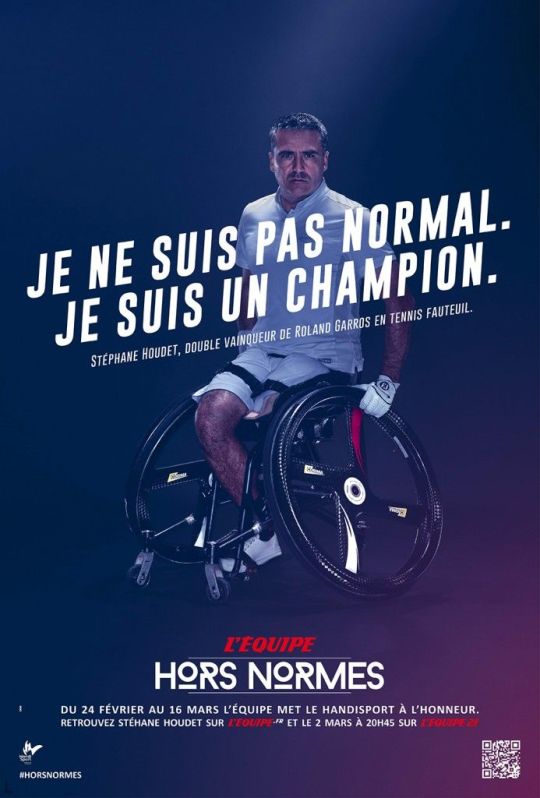
Les Jeux para participent aussi à entretenir un narratif sur le handicap : la nécessité de le dépasser. Si pour des athlètes encadréEs et aux moyens financiers illimités ça signifie aller rafler des médailles, qu’est ce que ça veut dire pour l’handiE lambda ? Devoir s’épuiser à tenter de vivre dans un monde qui vous exclut en permanence? Sans exiger la moindre adaptation ? En tout cas, c’est une réponse bien pratique pour éviter tout remise en cause. Si les écoles, transports, ou lieu de soin sont inaccessibles, il suffit de dépasser son handicap ! Ça fait des jolies histoires émouvantes en plus de maintenir le statu quo. Les obstacles imposées par une société inadaptée sont réduits à une tragédie individuelle que la ténacité et le courage permettent de surmonter.
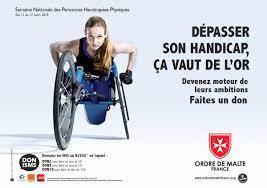

Les expériences de vie des athlètes les plus visibilisées sont loin du quotidien de la majorité des personnes handicapées, ce qui ne serait pas un problème si iels ne jouaient pas constamment le rôle de représentantEs. Les manifestations sportives tiennent à leur image « apolitique » qui les cantonne à des messages individualistes et souvent vides de sens à l’épreuve du réel. Les Jeux Paralympiques et les athlètes sont avant tout des sources d’inspirations prouvant que tout est possible, puisque même les handicapéEs y parviennent.
Toute la communication des Jeux para repose sur la célébration de l’exceptionnel, du hors du commun. Paradoxalement, on insistera continuellement sur le fait que ce sont des athlètes «comme les autres» qui méritent les même traitements que leur homologues valides Dans un contexte normalisé, c’est bien la capacité à imiter (voire surpasser) les actions des valides qui est encensée. Un dépassement souvent rendu possible par des technologies auxquelles la plupart des gens n’auront jamais accès (orthèses dernier cri, fauteuil de compétition, infrastructures adaptées...).
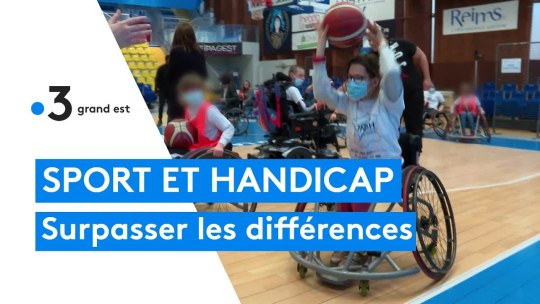
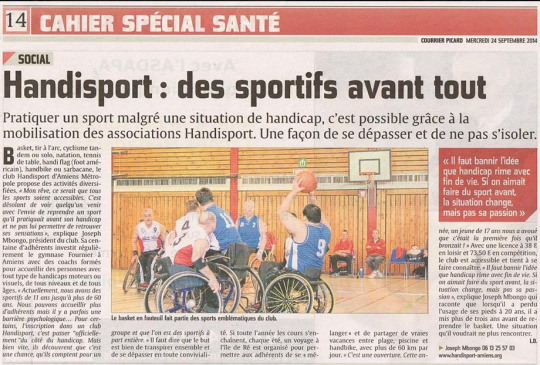
Le sport posséderait le pouvoir d’effacer toutes les différences, de régler une fois pour toutes la question de l’inclusion dans la célébration de la performance. Cette fête ne concerne pourtant pas les handiEs coincées dans des institutions médicales ou psychiatriques qui n’auront jamais accès à ces espaces. Tant pis aussi, pour les handiEs qui ne peuvent (ou ne veulent) pas faire de sport. Celleux-là, la majorité donc, n’aura qu’à se contenter en guise de reconnaissance de la pitié qu’elle provoque. Dans un contexte où la pression sur le système de protection des malades s’intensifie (remise en cause des remboursements de frais de santé, difficultés à obtenir des aides, à faire valoir leurs droits), il n’est pas neutre de toujours valoriser les mêmes modèles.
Les Jeux Paralympiques ne créent pas une meilleure acceptation de l’autre dans la société. Ils participent au contraire à normaliser l’idée que les personnes handicapées sont une sous catégorie d’humainEs, « dignes » uniquement lorsque qu’iels accomplissent des exploits.
Hors jeu
En valorisant certains corps au détriment d’autres, les Jeux participent à créer une norme, qui influence bien au-delà de la durée de l’événement. Ici, j’ai particulièrement développé la question des corps handicapés, mais c’est également le cas pour les corps non blancs et/ou qui ne correspondent pas aux normes genrées. Cette normalisation passe par des processus souvent humiliants comme les tests de féminité obligatoires pour les personnes jugées trop masculines par leurs adversaires. Elle passe aussi dans la parole des commentateurices sportifs, qui s’attachent à donner leur avis sur le physique des athlètes (en particulier femme). À noter qu’à ce stade les personnes trans ne font même pas partie de la conversation.
Les Jeux olympiques contribuent à l’exploitation, l’exclusion et l’expropriation des populations les plus marginalisées. Parmi elles, on compte les communautés citées plus haut, souvent condamnées à la précarité du fait de discriminations constantes. Présenter cet événement comme une démonstration d’inclusivité est un mensonge, et une justification hypocrite de plus à la souffrance que génère la tenue des Jeux pour les locaux forcés d’y participer (économiquement, spatialement...). Les Jeux olympiques ne sont pas une trêve internationale dédiée à la célébration du sport, mais un miroir grossissant sur tout ce qui ne fonctionne pas dans cette société. Quant à l’accessibilité, elle ne devrait pas être la caution de l’affaiblissement d’écosystème et de la gentrification des lieux de vie, dont nous sommes ensuite excluEs.
Par ailleurs, rappel que notre dignité ne se juge pas à nos exploits. Notre fierté handie peut reposer sur autre chose que notre capacité à imiter les personnes valides. La compétition entre les êtres, la recherche de la performance à tout prix, le culte de la force sont exactement la raison pour laquelle le handicap est perçu de facto comme une faiblesse. le fantasme de l’inclusion dans un monde régit par ces principes ne peut être qu’hypocrite. Le concept en lui-même repose sur l’idée d’une population «autre» qui faut inclure dans la norme. Nous restons l’autre, dans nos catégories et nos espaces à part. C’est le message des Jeux paralympiques qui font parti du problème, pas de la solution.
L’estropiéE attendrissant ou lea championNEs « hors normes » ne sont pas nos seules options. Il existe des alternatives, bien plus joyeuse à explorer, que celles basées sur des normes éditées contre nous.
Comme Avery Brundage, antisémite et raciste notoire, qui occupera la présidence pendant plus de vingt ans.
Des idées portées par Juan Antonio Samaranch, resté lui aussi 20ans à la présidence,
Voir le rapport « mega-events, olympic games et housing rights, opportunities for the olympic movement and others » ainsi que la brochure, déplacer les pauvres pour les Jeux. sur Saccage 2024.
Voir « Pourquoi on s’oppose aussi Jeux Paralympiques » écrit pas Objectif Autonomie en 2022.
à l’exemple du nageur brésilien Andre Brasil
3 notes
·
View notes
Text
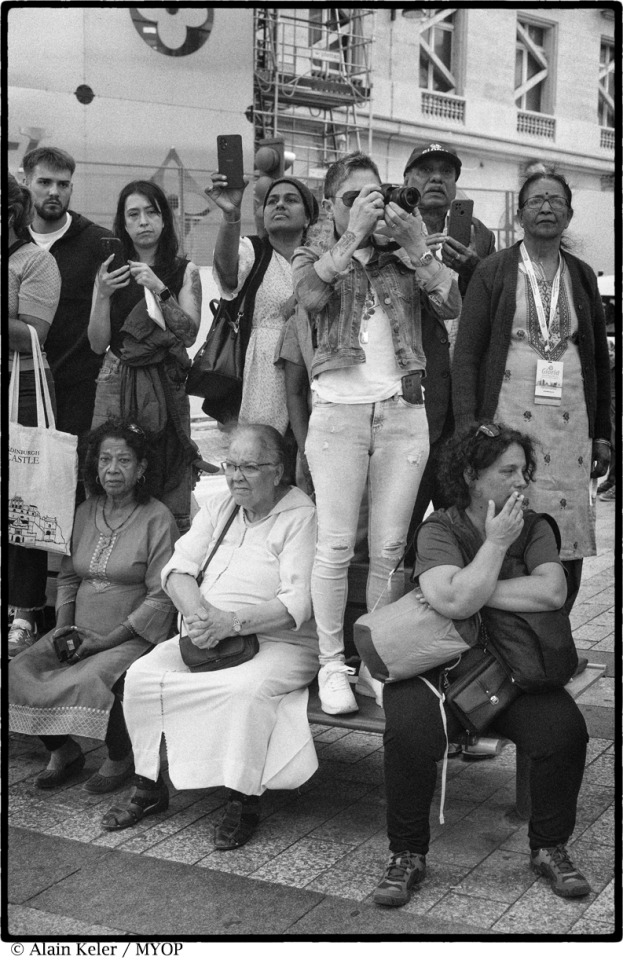
Mercredi 20 septembre 2023.
Journée royale pour mon anniversaire ! Beaucoup de marche, j’ai vaguement vu passer la voiture royale et présidentielle (mais le président de la République française n’est-il pas un roi élu pour cinq ou dix ans en cas de récidive, comme en ce moment).
J’ai préféré me tourner vers les spectateurs. Un peu déçu de ma photo, mais comme disait le Baron Pierre de Coubertin, l’important n’est pas de gagner, mais de participer* !
* La citation exacte : « Le plus important aux Jeux olympiques n'est pas de gagner mais de participer, car l'important dans la vie ce n'est point le triomphe mais le combat ; l'essentiel, ce n'est pas d'avoir vaincu mais de s'être bien battu ».
6 notes
·
View notes
Text


SAMEDI 19 AOÛT 2023 (Billet 4/4)
Et c’est au moment précis, toujours pour évoquer l’historique de « mesures » un peu particulières, où JM a voulu parler de la distance du marathon et pourquoi initialement fixée à 40 km elle est passée lors des Jeux Olympiques de Londres en 1908 à 42.195km, qu’un « MÉCHANT » ORAGE a éclaté !
Nous en étions au digestif mais tout a été gâché. Il a fallu débarrasser la table à toute vitesse (assiettes, couverts, verres, sets…), rentrer les chauffeuses, tous les coussins, le tapis, couvrir la Plancha… tout ça sous une pluie battante et dans la plus grande confusion.
Nous étions tristes pour nos invités… et surtout pour Inge qui venait pour la première fois à la maison. Dire que nous préparions ce dîner depuis 2 jours, que nous avions minutieusement élaboré le menu car l’un de nos invités était végétarien.
Pour l’apéro, nous étions allés chez « Tang », rue Labrouste (1 heure de marche A/R), pour acheter des mini-nems à la crevette et de succulents petits samossas aux légumes. Nous avions refait des petites verrines « betterave/oignon rouge/fromage Philadelphia ». Chez Picard, nous avons pu trouver, il n’y en a pas toujours, de grosses gambas du Vietnam que nous avons fait mariner depuis la veille dans du lait de coco, gingembre haché, coriandre et piment d’Espelette. Marina, qui n’est pas du tout une grande pâtissière, tout le monde le sait, a retenté sa tarte aux abricots, uniquement pour faire plaisir à nos hôtes…
ET PATATRAS, tout a été fichu en l’air avec cet orage, arrivé au dernier moment, SANS LA MOINDRE EDUCATION. Ça ne se fait pas ! Alors, au lieu de se terminer, paisiblement, sous les étoiles, notre soirée s’est achevée dans la confusion la plus totale.
Pour finir, comble de malchance, JM ne sait pas du tout ce qui s’est passé avec son iPhone mais il a perdu toutes les photos qui avaient été prises ce soir-là. Il ne s’explique pas pourquoi. Peut-être l’électricité statique de l’orage qui a dû créer un bug ? Les mystères de l’électronique…
Nos invités sont repartis en Taxi. Nous, nous nous sommes endormis à 3 heures du matin (authentique !), Marina ayant horreur de se coucher sans que tout ne soit rangé.
Les Italiens ont une jolie expression pour qualifier un fâcheux événement non prévisible : « VADO VIA ! ».
Mais certains d’entre vous, chers lecteurs/abonnés, voudraient bien connaître la fin de l’histoire de la longueur du Marathon. C’est ce dont nous aurions dû parler si nous n’avions pas été interrompus.
« Partout dans le monde, le marathon mesure toujours 42.195km. Mais savez-vous pourquoi il en est ainsi ? Voici les explications.
Les origines du marathon
Avant de répondre à la question, il faut remonter dans l'Antiquité, en -490 avant Jésus-Christ pour trouver trace du premier marathon de l'histoire, et ainsi comprendre ses origines. C'est l'histoire d'un messager grec, nommé Phidippidès, qui aurait couru de la ville de Marathon jusqu'à Athènes, pour annoncer aux citoyens la victoire des Grecs sur les Perses lors de la bataille de Marathon durant la 1ère Guerre Médique.
L'histoire raconte qu'en arrivant à Athènes, le messager, épuisé d'avoir couru d'une traite les 40km qui séparent les deux villes, auraient délivré son message, avant de mourir d'épuisement. Voilà donc pour l'origine du nom de l'exercice. Lors des premiers Jeux Olympiques modernes, organisés en 1896 à Athènes à l'initiative du baron français Pierre de Coubertin, les concurrents retenus ont donc couru un marathon en hommage à la course de Philippidès. Les organisateurs de ces premiers Jeux modernes ont opté pour une distance de 40 km, soit l'équivalent de la distance entre Marathon et Athènes.
Alors pourquoi 42.195km ?
C'est en 1908 que la distance moderne de 42,195 km a été fixée, lors des Jeux Olympiques de Londres. La famille royale anglaise voulait commencer la course au château royal de Windsor et la terminer dans le stade de White City (un stade aujourd'hui disparu). 41,83 km séparaient Windsor de ce stade.
Mais 3,218 km ont étés ajoutés à l’exigence de la famille royale pour que la course puisse se terminer à leurs pieds, devant la loge du stade qui leur était réservée. Suite à cette modification, de nombreux débats eurent lieu, et la distance officielle est alors vraiment et définitivement passée à 42,195 km en 1921. Celle courue aujourd’hui sur tous les continents.
(Source : « wikipedia.org »)
____________________________
Les 50% de sang anglais d’un de nos invités (l’autre moitié étant brésilienne), si nous avions pu avoir le temps d’en parler calmement, auraient été sûrement « fiers » ou « amusés » de savoir que la contenance des bouteilles de vin et la longueur du marathon, épreuve plus que symbolique des Jeux Olympiques, ont été modifiées à la convenance des sujets de « sa » Majesté.
Nous écrivons « sa » Majesté parce que la nôtre, heureusement ou malheureusement, on lui a coupé la tête, Place de la Concorde, le 21 janvier 1793 !!!
2 notes
·
View notes
Text

Auguste Rodin (French, 1840-1917) cast by Fonderie de Coubertin, Saint-Rémy-les-Chevreuses, France. Pierre de Wiessant, Monumental Nude
2 notes
·
View notes
Text
Professor Shaul Ladany shows the world that nothing is unreachable.
Professor Shaul Ladany not only survived the Bergen-Belsen concentration camp, he also miraculously escaped the acts of terror in the Munich Olympics in 1972.
The octogenarian is also a record-breaking athlete and esteemed professor of the Ben Gurion University in the Department of Industrial Engineering and Management.

He attributes much of his success to his experiences in the Holocaust.
“I was hungry all the time. I remember there were two fences, a barbed wire fence and an electric fence. There were about three meters between the two fences. A tomato plant started to grow. I remember seeing that small green tomato plant…it kept growing bigger and bigger and its color started to change. It changed from green to yellow and then became a little more red. My eyes were popping out of their sockets from eagerness to get that tomato which was unreachable.”
In retrospect Ladany believes that subliminally he set out on a life mission to prove that with a will, nothing is unattainable.
“You needed a series of lucky events to survive the Holocaust. As a result of that lucky streak I am able to prove to the world and to myself that NOTHING is unreachable.”
Case in point: Last week the 86-year-old completed the Maccabiah Half marathon in 4 hours and 27 minutes.
He has competed twice in the Olympics, representing Israel in the 1968 Mexico City Olympics and the 1972 Munich games. In 1972, he broke a world record for the 50-mile speed walk. He received The Pierre de Coubertin medal, the Olympic committee’s most prestigious award given to athletes who demonstrate
tremendous sportsmanship in the Olympic Games.

In Munich, his roommate woke Shaul and reported that a team member in the other apartment had been murdered and thrown outside. The terrorists were still inside the first apartment of the Israeli team when Shaul and another teammate escaped through the back. They had to cross an open lawn, in clear view of the terrorists.
He alerted authorities to the attack, which tragically ended in the deaths of 11 Israelis. Ladany and four others survived.
The walls of his home are not only lined with trophies and awards for having triumphed in sport competitions, but in academia as well.
He is the chairman of the department of industrial engineering and Professor emeritus of Ben Gurion University. He was also given The Ben Gurion Award in life achievement category.
Learning to bear the discomfort
For Ladany, the Holocaust generated a lot of motivation that he cultivated within himself to achieve a life of full of success in many fields including academia.

“It taught me to be able to live with discomfort…When you are racing it’s not the most pleasant feeling. You have to make an effort. Since I had experienced challenge during the Holocaust, I knew how to take the discomfort.”
The professor is also fond of Vince Lombardi’s motto: “Winners never quit and quitters never win.” He internalizes this lesson and when he starts something, he finishes it.
Hidden in a Monastery
His family escaped to Budapest, but they soon realized that it was not any safer there. His parents made the painful yet necessary decision to hide their children in a monastery where they took refuge.
“My father walked me to the gate, hugged me, and rang the bell. The priest opened the door and did not ask any questions. He let me in and closed the door behind me.”
As an 8-year-old child, Ladany was forced to hide his Jewish identity in order to survive.
“In the monastery, I feared for my life. I was always feeling trauma because I knew that if anyone would detect that I was Jewish, they would kill me.”
At prayer time it became clear that Ladany did not know the services. He cleverly responded that the reason he was unfamiliar with the Catholic prayers was because he was Protestant.
Today, Ladany is relieved and proud that he does not have to hide his Jewish identity. He travels the globe speaking to young and old about the power of motivation. He encourages the world never to forget which he believes is the key to being able to live in peace and democracy today.
7 notes
·
View notes